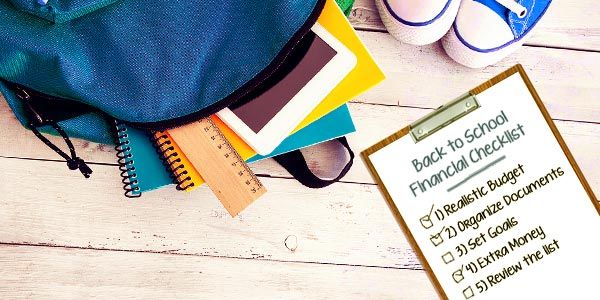Back-to-school financial checklist: What you need to do

That time of the year! A new session, new opportunities, new beginning.
This is the perfect time to revisit your financial life and plan to get on the right track for the rest of the year.
Here’s a back-to-school financial checklist to review your monetary situation and take necessary steps to secure your finances.
Make a correct assessment of your financial situation
There is no point in setting financial goals if you are not aware of your current financial situation.
Try to plan a realistic budget that you can follow
The most important thing in your personal financial planning checklist is to plan a realistic budget. By that I mean, a budget that will fulfill your financial goals, and which you can follow without much difficulty.
For example, if you’re able to plan a realistic budget, you can save a decent amount every month. You can use your money for your needs instead of wasting your dollars on something which you may not need at present.
This back-to-school time is the perfect time to start planning your financial life.
Gather and organize your financial documents
Back-to-school financial planning also includes organizing your financial documents. Make sure you read the documents while filing them. Doing so, you’ll come to know small details that can help you organize your financial life.
While reviewing your credit card statements, tick off the purchases you’ve made. This way, you’ll be able to identify if there’s any fraudulent activity in your accounts.
Do not keep all your receipts. You need to declutter your home of receipts from time to time. So, select a day in a month when you reconcile your ATM slips and other slips with your financial statements, and then shred and discard.
While discarding them, make sure you use a paper shredder since they contain valuable information.
Look at your home and make a list of things you need to buy
Before you make the purchasing list, make a list of items you need, and look at your home to know whether or not you already have those. This is one of the most important back-to-school financial tips. Why will you buy things you already have at your home?
Then, you make the shopping list with which you’ll go to the stores.
Take this opportunity to make your home clutter free, be it old documents or the things which you won’t need soon.
Set goals and break them into manageable ones
This back-to-school time is the perfect opportunity to set goals and break them into manageable ones. Start by planning financial goals for a year or so.
This will help you plan your lifetime financial goals.
Breaking the goals into manageable ones is important. Doing so, you can periodically assess whether or not you’ve been able to attain your financial goals.
Pull out your credit reports and review them
Review your credit reports at regular intervals and check out if there are any errors. Usually, you are entitled to getting a free credit report, from each of the credit bureaus, every year.
Review your reports minutely. Look for errors, if any. Doing so, you’ll come to know if you’ve become a victim of identity theft.
Look where you can cut down your expenses
If you’ve read some of the personal finance articles, then by now you must be wondering, why haven’t I mentioned about this point.
Yes! Cutting down expenses is one of the requirements of your back-to-school personal financial checklist.
For example, as I’ve already discussed, look for items already at your home so that you can cut down some of your back-to-school expenses.
Reduce your car insurance requirements if possible
If you’re using a car, review your insurance needs. If you have good grades in school, you may be eligible for good driver discounts.
Another way to reduce car insurance price is to shop around and compare the prices. Go for the one that offers you the required coverage at a good price.
Often being loyal to an insurance company doesn’t benefit you financially. I mean that being loyal to an insurer doesn’t always mean that you’ll get the most suitable terms and conditions. So, compare coverage with the price when your policy is up for renewal.
And, if you or your family members have health insurance along with the car insurance policies from one insurer, then you can enjoy a better rate altogether.
Opt for back-to-school financial aid if required
There is a myth that there’s no financial aid for adult students. The fact is that there’s no age limit to receive such aid. Almost everyone can qualify for some kind of financial aid or federal student loans.
So, check out the websites and gather information so that you can apply for the right financial aid if required.
Another important thing in your back-to-school personal financial checklist is to reevaluate your taxes. If you’ve started working while still completing your education, then you may be entitled to some extra tax deductions. Moreover, if you make charitable contributions, then also you can be entitled to deductions.
If required, you can talk to a financial adviser. You can also take part in the forums if you have any queries regarding your back-to-school financial strategies. The experts and fellow members can help you to manage your personal financial life effectively.
